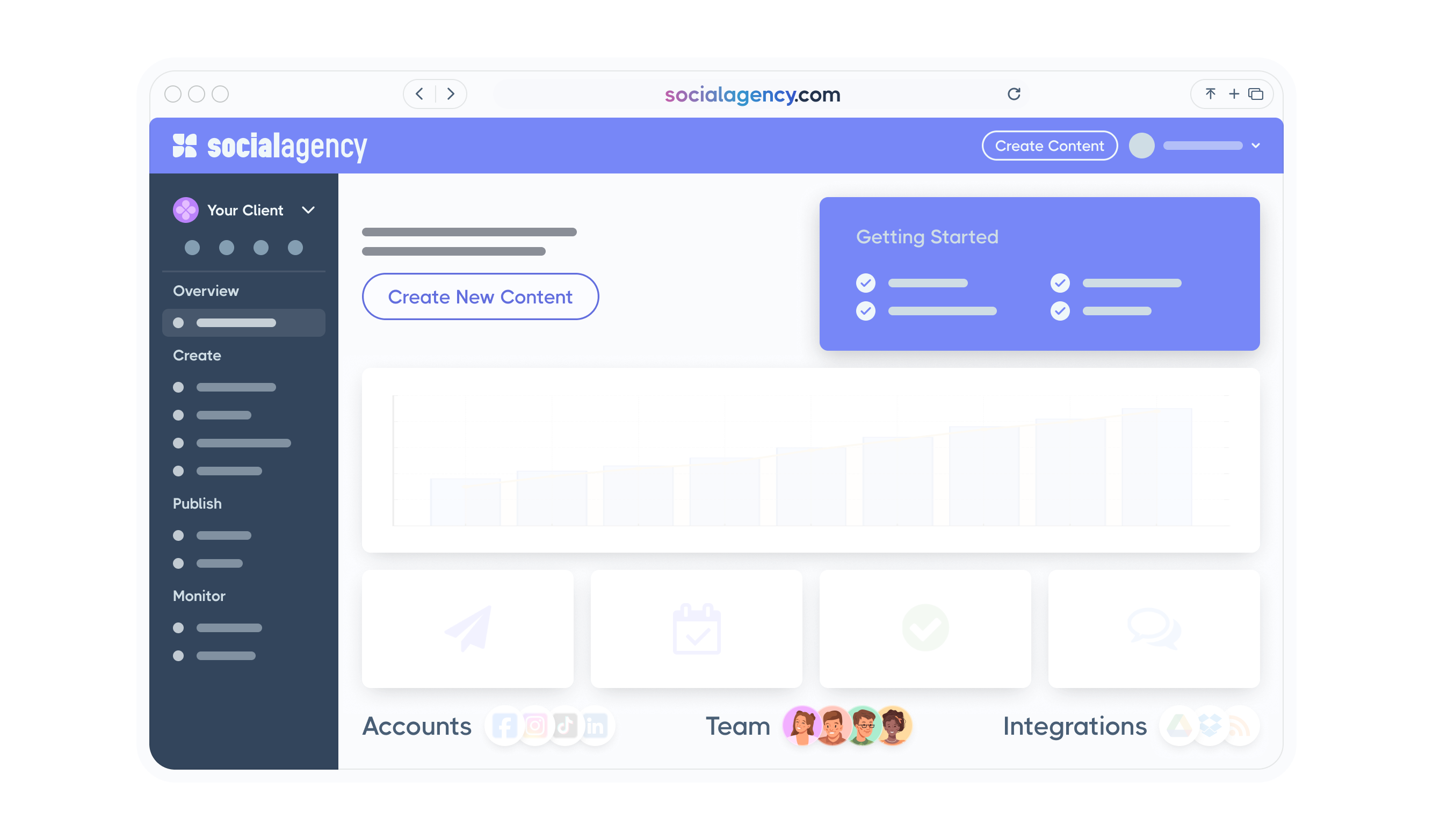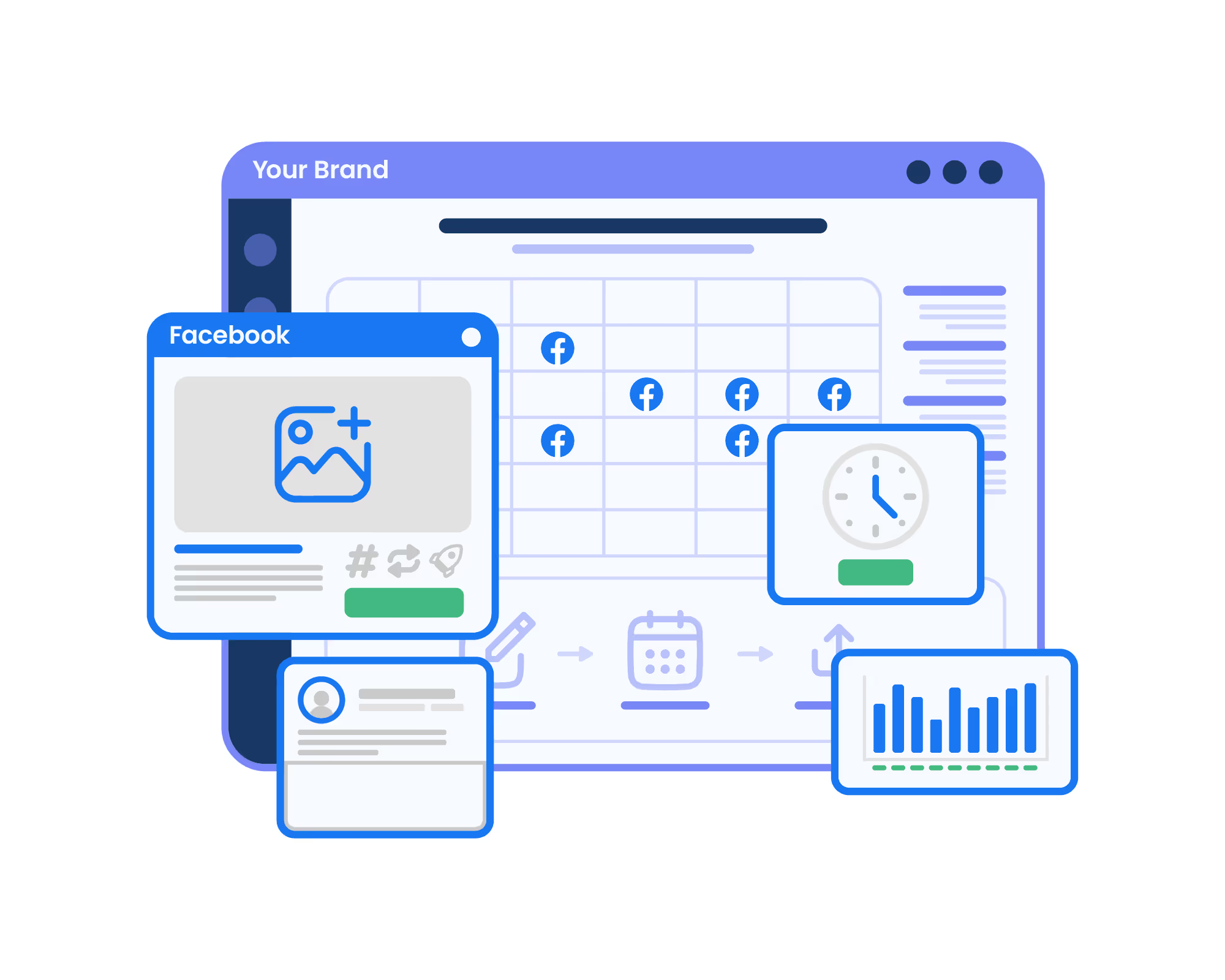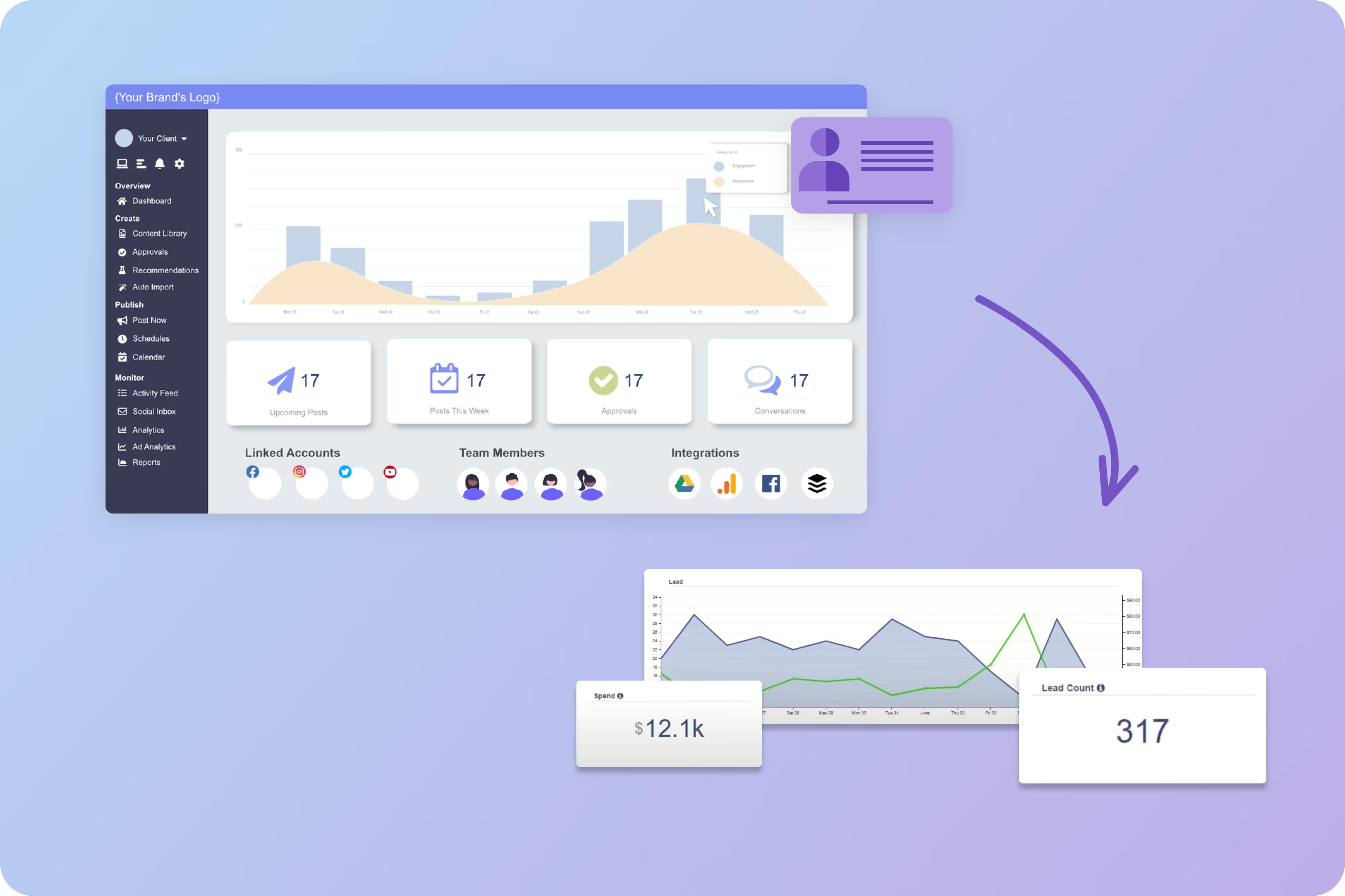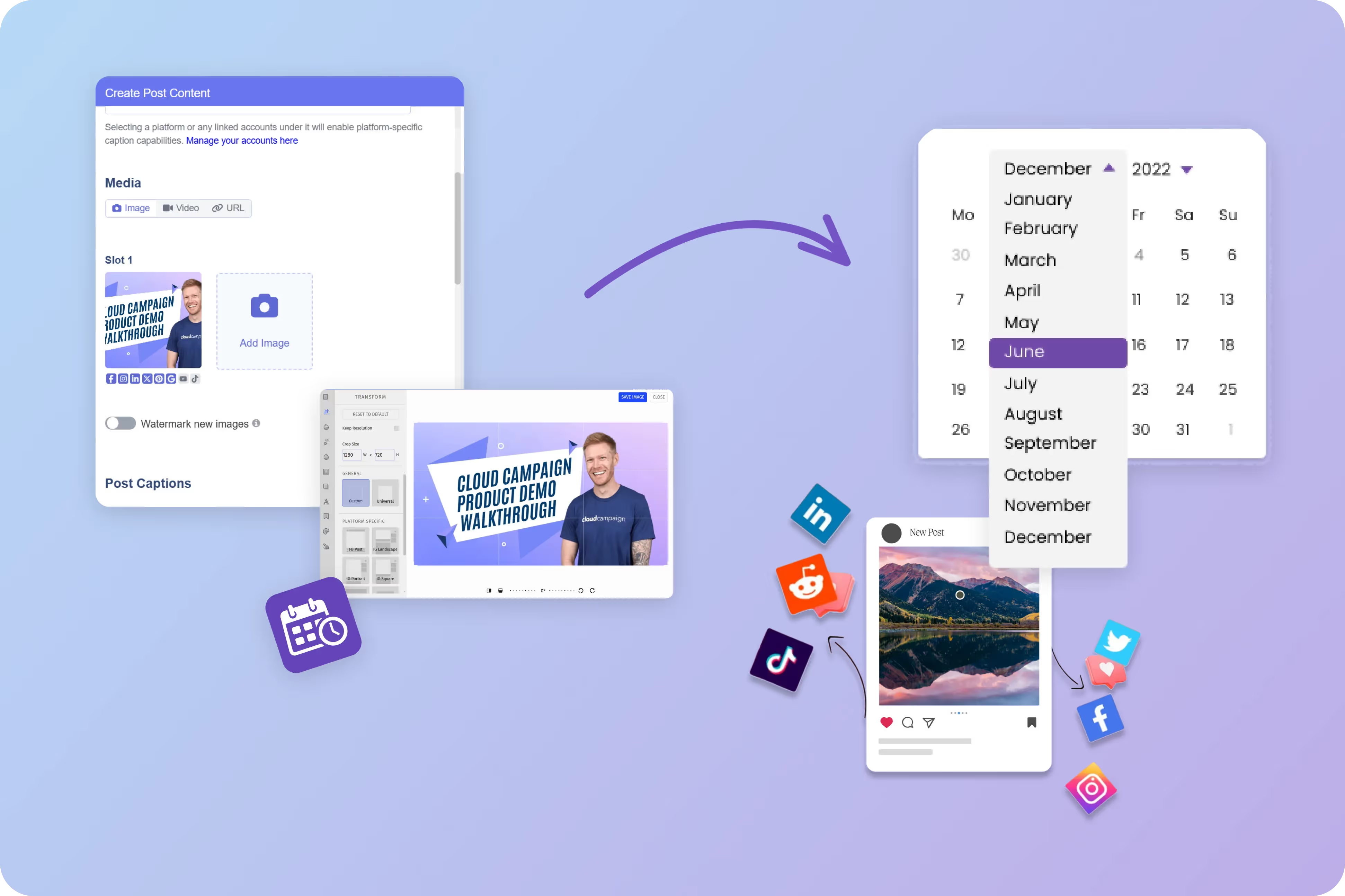


Trusted by Industry Leading Agencies









Effortless Facebook Post Scheduling
Batch-create your Facebook content when you're in the zone, then schedule it to post throughout the week. No more scrambling to write captions at the last minute or posting at random times because that's when you finally had a free moment. Perfect for agencies juggling multiple client Pages or brands that need consistent visibility without the daily grind.

Trusted by Industry Leading Agencies










Your best posting times probably aren't your working hours.
Your Facebook analytics might show peak engagement at 6 AM, during lunch hour, or late evening—times when you're commuting, eating, or definitely not thinking about work. A scheduler bridges that gap. Set up your posts to go live during those high-traffic windows while you're doing anything but staring at Facebook. You'll reach more people without being online 24/7, and your content calendar stays full even during your busiest weeks.

We only win when you win.
Olivia F.


"Cloud Campaign - MUST USE!"
Overall I’d recommend Cloud Campaign to any freelance social media content creator/manager. Super seamless and easy to use, and the best part is clients can log in and keep track as well!
Jennifer B.


"Cloud Campaign is my new favorite tool!"
There's so much I like about Cloud Campaign! It continues to learn and adapt based on my posting routine. I also really like the Canva integration, which I use daily! It has eliminated the step of my having to download content and then upload it into the program. I also really enjoy the ease of reporting and then sharing those reports with my clients.
Josh J.


"Love Cloud Campaign!"
I love the simplicity of posting. I run an agency and always had a challenge posting for my clients or guiding them to create content calendars...I wanted them to have a simple platform so that they could post their content to multiple channels all at once.
Scheduling Social Media Posts has Never Been Easier
Cloud Campaign makes automatically scheduling content easy! In this video, we show you how to use Categories to create automatic posting engines, saving you precious time and energy during your work week.


Key Features

Schedule to Pages and Groups
Your client has a Facebook Page, three community groups, and maybe a personal profile where you share business content. A solid scheduler lets you post to all of them from one dashboard instead of copying and pasting the same update five times. Manage your entire Facebook presence without the repetitive busywork.
.avif)
Optimal Timing by Audience
Your Facebook audience might be scrolling at completely different times than your Instagram or LinkedIn followers. A good scheduler analyzes when your specific Facebook fans are most active and suggests posting times that maximize reach. What works on other platforms probably won't work here—let the data decide.

Content Approval Workflows
Managing a Facebook Page for a corporate client or regulated industry means nothing posts without sign-off. Cloud Campaign is a Facebook scheduler with built-in approval chains where team members can review, request changes, and approve content before it's scheduled. The paper trail keeps everyone accountable and prevents costly mistakes.
Social Media Use Cases
.svg)
Maintain Consistent Page Activity
A single hectic week—client deadlines, unexpected priorities, team obligations—can derail your Facebook posting schedule entirely. Nine days without content signals inconsistency to both your audience and the algorithm, potentially impacting your reach. Cloud Campaign ensures regular content delivery even during demanding periods because posts are queued in advance. Your pages maintain the professional, active presence that builds audience trust and algorithmic favor, regardless of daily workload fluctuations.
.svg)
Run Multi-Day Event Promotions
Your webinar is next Friday and you need a week of build-up posts: registration reminders, speaker spotlights, and sneak peeks. Schedule the entire sequence in advance so each piece of the campaign drops at the right time. You'll drive registrations without having to remember what to post when.
.svg)
Consistently Manage Facebook Groups
Your community group needs regular engagement—weekly discussion threads, member spotlights, or resource shares. Schedule these recurring posts so your group stays active even during your busy weeks. Consistent moderation and content keep members engaged and coming back
.svg)
Coordinate Your Facebook Schedule With Email Campaigns
Your newsletter goes out Tuesday morning announcing a flash sale, and your Facebook post needs to hit at the same time. Schedule it to coincide with your email send so your audience gets a cohesive omnichannel message. Timing is everything when you're trying to create urgency.
.svg)
Manage Multiple Client Pages
Agency teams juggling ten different Facebook Pages need one place to see everything. Schedule content for all your clients from a single calendar view so nobody's Page goes dark. Switch between accounts instantly instead of logging in and out of Facebook Business Manager all day.
.svg)
Plan Holiday Content in Advance
Black Friday, Small Business Saturday, and Cyber Monday all need different Facebook posts with specific deals. Schedule your entire holiday campaign in October so December isn't a panicked scramble. When everyone else is stressed about last-minute posts, yours are already queued and ready.
Related Blogs
Social Media Scheduling for Agencies
Maximize your agency's efficiency by implementing social media scheduling that ensures posting consistency, enables global scalability across multiple time zones, and prevents missing important industry holidays—all while letting you sleep soundly knowing your clients' content is handled.
The Most Efficient Social Media Posting Workflow For SMMs
Transform your social media management process with this five-step workflow covering research, content creation, scheduling automation, streamlined approvals, and performance analytics that will save hours of work while maintaining strategic focus for multiple clients.
The Best Client Approval Process
Streamline your client approval workflow with an automated system that allows real-time feedback, selective approvals, and seamless mobile access—eliminating spreadsheet headaches while building stronger client relationships through transparent collaboration.
How to Scale SMM Services
Scale your social media management services by implementing automated posting strategies that maintain consistency, leverage AI content creation, create effective content calendars, and balance automation with authentic engagement to maximize efficiency without losing the human touch.
Does Scheduling Instagram Posts Affect Engagement?
Debunking the myth that scheduling Instagram posts hurts engagement, this guide explains how using scheduling platforms actually enhances your social strategy by ensuring consistency, optimizing posting times, providing valuable analytics, and streamlining workflows for better results.
How to Manage Your IG Content Calendar
Create a strategic Instagram content calendar by defining clear goals, organizing content by categories and schedules, using the right management tools, and implementing a template that tracks timelines, content types, publishing schedules, and performance metrics.

Ready to Level up your agency?
Start your free trial today.
Frequently Asked Questions
.png)



